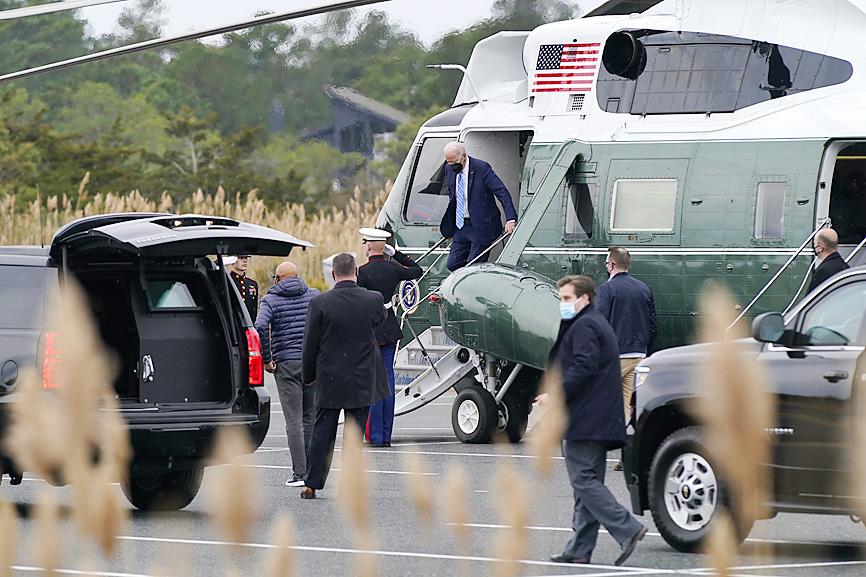The government yesterday thanked the US for reiterating its support for Taiwan’s security after US President Joe Biden on Monday signed the National Defense Authorization Act into law, which advises the US executive branch to invite Taiwan to join the Rim of the Pacific Exercise (RIMPAC) amid a statement of congressional support for the defense of Taiwan.
“The act authorizes fiscal year appropriations principally for the [US] Department of Defense, for Department of Energy national security programs, and for the Department of State,” Biden said in a statement.
Following several rounds of negotiations in the US Congress, the act keeps four articles related to Taiwan, Ministry of Foreign Affairs spokeswoman Joanne Ou (歐江安) told a news briefing in Taipei.

Photo: AP
The US reiterated its commitment to Taiwan’s security, as set forth in the US’ Taiwan Relations Act and the “six assurances,” Ou said.
It supports the US National Guard to cooperate with Taiwan and help Taiwan maintain a sufficient self-defense capability, and advises the US’ executive branch to invite Taiwan to participate in next year’s RIMPAC, she said.
Since Biden’s administration took office in January, it has repeatedly said that its support for Taiwan is “rock solid” while taking concrete action to demonstrate its support, Ou said.
Taiwan would continue to work with the US and other like-minded countries to contribute to peace, stability and prosperity across the Taiwan Strait and the Indo-Pacific region, Presidential Office spokesman Xavier Chang (張惇涵) said in a statement.
Asked if the US’ disagreements with its allies, such as Nicaragua, might affect Taiwan’s ties, Ou said that the nation is responsible for maintaining its own diplomatic relations.
The ministry considers consolidating relations with existing allies and boosting practical partnerships with the US, Japan and other like-minded countries to be equally important, Ou said.
The nation has only 14 diplomatic allies after Nicaragua switched recognition from Taipei to Beijing on Dec. 9.
After ordering Taiwanese diplomats to leave by Thursday last week, the South American country is reportedly trying to transfer Taiwan’s assets to China.
The ministry had sold the building that housed its former mission in Nicaragua to the Archdiocese of Managua at a symbolic price of US$1, based on a contract signed on Wednesday, Ou said.
Regarding the Nicaraguan government’s attempt to illegally expropriate the building and transfer it to Beijing, the government is seeking legal action through international channels, as well as help from other countries, she said.
Taiwanese compatriots and businesspeople in Nicaragua should watch out for their own safety and, if necessary, ask for help from Taiwan’s embassy in Honduras, which has taken over businesses related to Nicaragua, she said.
Additional reporting by AP

ACTION PLAN: Taiwan would expand procurement from the US and encourage more companies to invest in the US to deepen bilateral cooperation, Lai said The government would not impose reciprocal tariffs in retaliation against US levies, President William Lai (賴清德) said yesterday, as he announced five strategies to address the issue, including pledging to increase Taiwanese companies’ investments in the US. Lai has in the past few days met with administrative and national security officials, as well as representatives from various industries, to explore countermeasures after US President Donald Trump on Wednesday last week announced a 32 percent duty on Taiwanese imports. In a video released yesterday evening, Lai said that Taiwan would not retaliate against the US with higher tariffs and Taiwanese companies’ commitments to

Intelligence agents have recorded 510,000 instances of “controversial information” being spread online by the Chinese Communist Party (CCP) so far this year, the National Security Bureau (NSB) said in a report yesterday, as it warned of artificial intelligence (AI) being employed to generate destabilizing misinformation. The bureau submitted a written report to the Legislative Yuan in preparation for National Security Bureau Director-General Tsai Ming-yen’s (蔡明彥) appearance before the Foreign Affairs and National Defense Committee today. The CCP has been using cognitive warfare to divide Taiwanese society by commenting on controversial issues such as Taiwan Semiconductor Manufacturing Co’s (TSMC, 台積電) investments in the

HELPING HAND: The steering committee of the National Stabilization Fund is expected to hold a meeting to discuss how and when to utilize the fund to help buffer the sell-off The TAIEX plunged 2,065.87 points, or 9.7 percent, to close at 19,232.35 yesterday, the highest single-day percentage loss on record, as investors braced for US President Donald Trump’s tariffs after an extended holiday weekend. Amid the pessimistic atmosphere, 945 listed companies led by large-cap stocks — including Taiwan Semiconductor Manufacturing Co (TSMC, 台積電), Hon Hai Precision Industry Co (鴻海精密) and Largan Precision Co (大立光) — fell by the daily maximum of 10 percent at the close, Taiwan Stock Exchange data showed. The number of listed companies ending limit-down set a new record, the exchange said. The TAIEX plunged by daily maxiumu in just

‘COMPREHENSIVE PLAN’: Lin Chia-lung said that the government was ready to talk about a variety of issues, including investment in and purchases from the US The National Stabilization Fund (NSF) yesterday announced that it would step in to staunch stock market losses for the ninth time in the nation’s history. An NSF board meeting, originally scheduled for Monday next week, was moved to yesterday after stocks plummeted in the wake of US President Donald Trump’s announcement of 32 percent tariffs on Taiwan on Wednesday last week. Board members voted to support the stock market with the NT$500 billion (US$15.15 billion) fund, with injections of funds to begin as soon as today. The NSF in 2000 injected NT$120 billion to stabilize stocks, the most ever. The lowest amount it